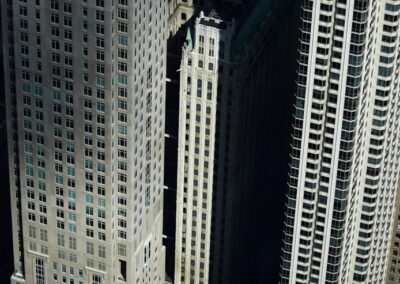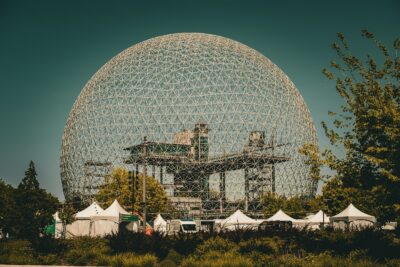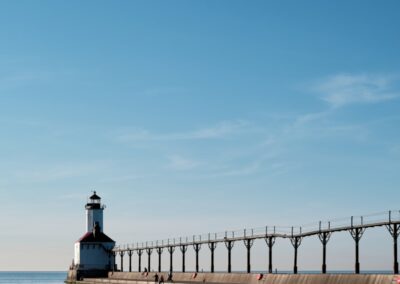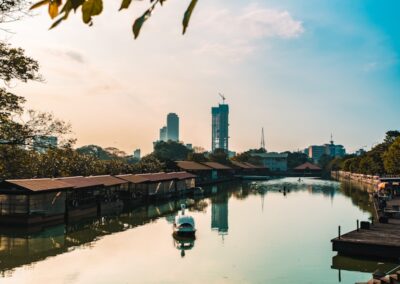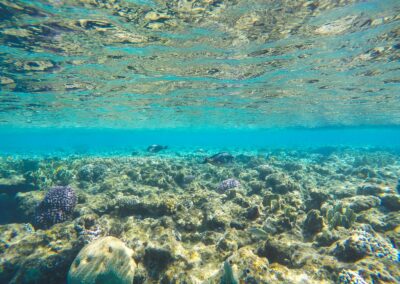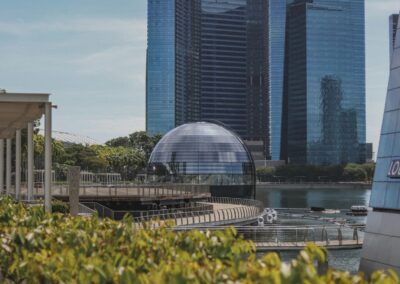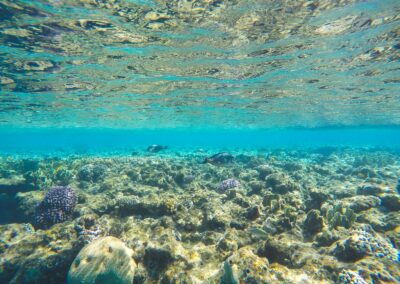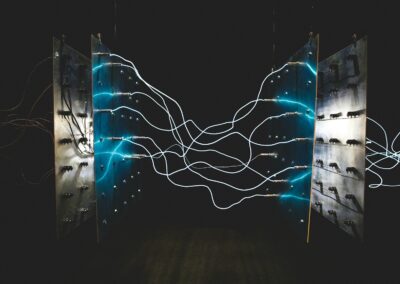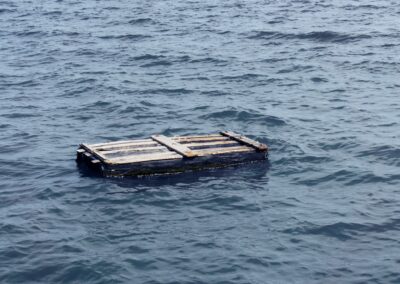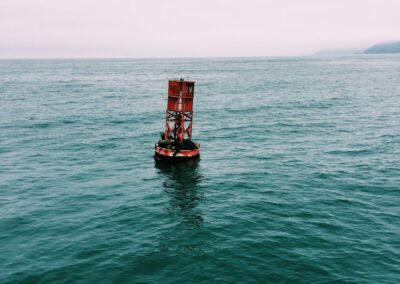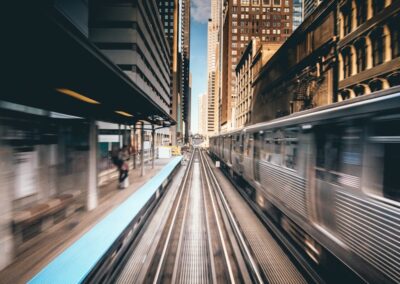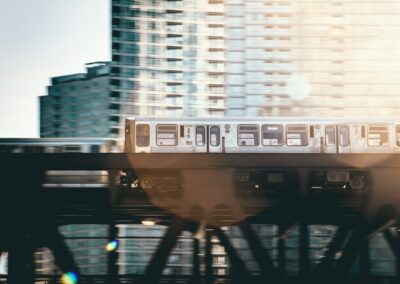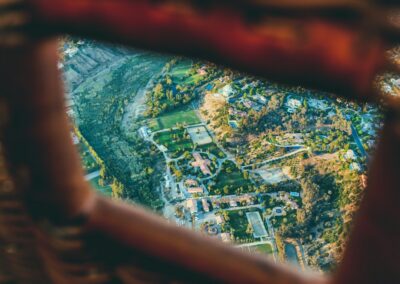Understanding the Environmental Impacts of Floating Cities
The Rise of Floating Urban Development in Saudi Arabia and UAE
The environmental impacts of floating cities have become a significant topic of discussion as urban planners and developers seek innovative solutions to accommodate growing populations while preserving natural ecosystems. Floating cities, by their very nature, present unique environmental challenges and opportunities. In regions like Saudi Arabia and the UAE, where rapid urbanization and environmental sustainability are both priorities, careful planning and design are crucial to mitigate potential adverse impacts.
Saudi Arabia’s Vision 2030 and UAE’s commitment to sustainability have spurred interest in floating urban developments. Riyadh, with its strategic focus on green technology and smart city initiatives, stands to benefit from integrating floating cities into its urban fabric. However, the construction and operation of floating cities can impact marine ecosystems, water quality, and local wildlife. To address these concerns, Riyadh’s urban planners must adopt comprehensive environmental impact assessments and implement strategies to minimize ecological disruption. This includes designing floating structures that enhance water circulation, using eco-friendly construction materials, and incorporating green spaces to support biodiversity.
Dubai, known for its architectural innovation and environmental consciousness, is also exploring floating city concepts. The environmental impacts of such developments in Dubai’s coastal and marine environments must be carefully managed. Potential issues include disruption of marine habitats, water pollution, and increased energy consumption. Dubai can mitigate these impacts by adopting floating city designs that incorporate advanced waste management systems, renewable energy sources, and water purification technologies. By leveraging its expertise in sustainable urban planning, Dubai can create floating cities that harmonize with the natural environment and support long-term ecological health.
Innovative Planning and Design Solutions
Mitigating the environmental impacts of floating cities requires innovative planning and design solutions that prioritize sustainability. In Saudi Arabia and the UAE, urban planners and developers are employing cutting-edge technologies and green design principles to ensure that floating urban developments are both ecologically and economically viable.
Incorporating renewable energy systems is a key strategy for reducing the environmental footprint of floating cities. Solar panels and wind turbines can be integrated into the design of floating structures to provide clean, renewable energy. This approach not only reduces reliance on fossil fuels but also minimizes greenhouse gas emissions. In Riyadh, where sunlight is abundant, solar energy can be harnessed effectively to power floating cities. Additionally, vertical axis wind turbines can be used to capture wind energy, further enhancing the sustainability of these developments. By adopting renewable energy solutions, Riyadh can create floating cities that are energy-efficient and environmentally friendly.
Dubai’s approach to sustainable floating city design includes the use of green architecture and smart technologies. Green roofs and walls, for example, can be integrated into floating structures to provide insulation, reduce energy consumption, and support local biodiversity. Smart grid technology can optimize energy use and manage resources efficiently, ensuring that floating cities operate sustainably. Moreover, Dubai can implement advanced water management systems, such as desalination plants and rainwater harvesting, to ensure a reliable and sustainable water supply. By embracing these innovative planning and design solutions, Dubai can mitigate the environmental impacts of floating cities and promote sustainable urban development.
Environmental Stewardship and Community Engagement
Effective environmental stewardship and community engagement are essential components of sustainable floating city development. In Saudi Arabia and the UAE, fostering a culture of environmental responsibility and involving local communities in the planning process can enhance the success of floating urban projects.
Riyadh’s commitment to environmental stewardship involves engaging stakeholders, including government agencies, private developers, and environmental organizations, in the planning and development of floating cities. Public awareness campaigns and educational programs can help residents understand the environmental benefits and challenges associated with floating urban developments. By promoting a culture of sustainability and encouraging community participation, Riyadh can ensure that floating cities are designed and operated in an environmentally responsible manner. Additionally, involving local communities in the planning process can provide valuable insights and foster a sense of ownership and support for these innovative urban projects.
Dubai’s approach to community engagement in floating city development emphasizes transparency and inclusivity. Public consultations and forums can provide opportunities for residents to share their views and contribute to the planning process. By incorporating community feedback, Dubai can address potential environmental concerns and ensure that floating cities meet the needs and expectations of local residents. Environmental stewardship initiatives, such as coastal clean-up programs and biodiversity conservation projects, can further enhance community involvement and support for sustainable urban development. By fostering a collaborative approach to environmental stewardship, Dubai can create floating cities that are not only innovative but also environmentally and socially sustainable.
Leadership and Management in Sustainable Floating City Development
Strategic Leadership for Environmental Sustainability
Leadership plays a critical role in promoting environmental sustainability in floating city development. In Saudi Arabia and the UAE, strategic leadership involves setting clear sustainability goals, fostering collaboration, and ensuring that environmental considerations are integrated into all aspects of urban planning and development.
Riyadh’s leaders are at the forefront of driving sustainable urban development initiatives. By setting ambitious targets for renewable energy adoption and environmental conservation, they are paving the way for the integration of floating cities into the city’s urban landscape. Collaboration with international experts and environmental organizations can provide valuable knowledge and resources to support these efforts. Strategic leadership also involves advocating for policies and regulations that promote sustainable practices and protect natural ecosystems. By demonstrating strong leadership, Riyadh’s leaders can ensure that floating city developments align with the city’s sustainability vision and contribute to long-term environmental health.
Dubai’s leadership in sustainable urban development is characterized by its commitment to innovation and environmental responsibility. The city’s leaders are actively promoting the integration of renewable energy, green architecture, and smart technologies in floating city projects. Public-private partnerships and international collaborations are essential for leveraging expertise and resources to achieve sustainability goals. Additionally, Dubai’s leaders are focusing on creating a regulatory framework that supports sustainable urban development and ensures that environmental impacts are minimized. By demonstrating visionary leadership, Dubai’s leaders are positioning the city as a global model for sustainable floating urban development.
Management Skills for Sustainable Development Projects
Effective management is crucial for the successful implementation of sustainable floating city projects. Project managers in Saudi Arabia and the UAE play a key role in coordinating the various aspects of these complex developments, from planning and design to construction and operation.
In Riyadh, project managers are responsible for ensuring that floating city projects meet sustainability targets and comply with environmental regulations. This involves coordinating with architects, engineers, and environmental experts to incorporate green design principles and renewable energy systems into the project. Project managers must also manage resources efficiently and ensure that projects are completed on time and within budget. Effective communication and stakeholder engagement are essential for addressing potential environmental concerns and securing support for the project. By demonstrating strong management skills, Riyadh’s project managers can drive the successful implementation of sustainable floating city projects.
Dubai’s project management community is also embracing the challenges of sustainable floating city development. Project managers are utilizing advanced project management tools and techniques to plan and execute complex urban projects. This includes the use of Building Information Modeling (BIM) to optimize the design and construction process and ensure that renewable energy systems and green architecture are efficiently integrated. Additionally, project managers in Dubai are skilled in risk management and stakeholder engagement, ensuring that all parties involved in the project are aligned with sustainability goals. By demonstrating effective management skills, Dubai’s project managers are driving the successful implementation of sustainable floating city projects.
Future Prospects and Ethical Considerations
The future prospects of floating cities are promising, but they also come with ethical considerations that must be addressed. In Saudi Arabia and the UAE, ensuring that floating city developments are implemented responsibly and equitably is a priority for both policymakers and practitioners.
In Riyadh, ethical frameworks are being developed to guide the integration of renewable energy systems into floating cities. These frameworks emphasize the importance of accessibility, ensuring that all residents can benefit from the sustainability advantages of renewable energy. Additionally, ethical considerations include the use of sustainable materials and practices that minimize environmental impact. By addressing these ethical issues, Riyadh aims to create floating cities that promote equity and sustainability.
Dubai’s approach to ethical floating urban development involves fostering public engagement and transparency. The city is promoting discussions and initiatives that address the social and environmental implications of renewable energy integration in floating cities. This includes ensuring that renewable energy projects are inclusive and provide benefits to all community members. Public awareness campaigns are also being conducted to educate residents about the importance of renewable energy and encourage their participation in sustainability efforts. By prioritizing ethical considerations, Dubai is setting a standard for responsible and inclusive floating urban development.
Conclusion: Embracing Sustainability in Floating City Development
The environmental impacts of floating cities can be mitigated through careful planning, innovative design, and strong leadership. In Saudi Arabia and the UAE, floating city developments represent a unique opportunity to expand urban spaces sustainably. By integrating renewable energy systems, adopting green design principles, and engaging local communities, these countries are leading the way in sustainable urban development.
As the benefits of floating cities become increasingly evident, their integration into urban planning will continue to grow. By embracing sustainability and addressing environmental and ethical considerations, Saudi Arabia and the UAE are setting an example for the global community. The ongoing investment in renewable energy projects and commitment to sustainable practices ensure that these countries remain at the forefront of innovative urban development, ready to navigate the challenges and opportunities of the future.
#EnvironmentalImpact #FloatingCities #SustainableDevelopment #RenewableEnergy #GreenArchitecture #UrbanResilience #SaudiArabia #UAE #Riyadh #Dubai #ModernTechnology #BusinessSuccess


